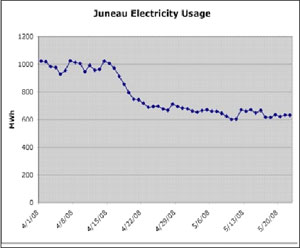Yeah Alaska! Yeah Brazil! Yeah California?
 The people of Juneau saved electricity in a hurry-- when electricity
The people of Juneau saved electricity in a hurry-- when electricity
went to 55 cents per kilowatt-hourIn Juneau, Alaska, an avalanche on April 16th downed transmission lines and cut off the city from it's cheap source of hydroelectric power; electricity prices jumped by 500%. Alan Meier-a scientist at Lawrence Berkeley National Laboratory, Home Energy Magazine's Senior Executive Editor, and an expert in how to cut energy use in a hurry-was called in to help. Within a few weeks the city reduced its electricity use by 30%. Remember that we reduced our electricity use in California by 15% in response to Enron and other power companies manipulating the power markets in 2001? Alaska reduced its electricity use by twice as much and did it in a hurry.
How did the Alaskan's do it? They lowered their thermostats. They bought out all the CFLs from the hardware stores and you bet they turned out the lights when they left the room-wouldn't you if electricity cost 55 cents per kilowatt hour? They took shorter showers and used cold water to wash their clothes. The city ran out of clothespins since so many people were hanging out there clothes to dry (anecdotal evidence suggests it takes two days to dry jeans).
The people of Juneau bought power strips in record numbers, so that they could really turn off power to all those devices that still use power when they are supposed to be off, like TVs and stereos, microwave ovens and cell phone chargers. And there was a lot of talk from city leaders, on the radio, and among neighbors and classmates about the best ways to save.
(Note: You generally use more energy when you wash your dishes by hand rather than washing full loads in a dishwasher-not everything they did helped.)
